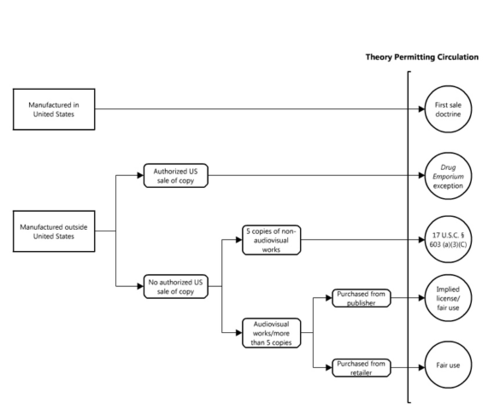Last Updated on January 31, 2011, 7:43 pm ET
NB: This post has been updated to reflect the availability of the Drug Emporium exception wherever the Costco rule might be applied. The original version stated mistakenly that the exception was only available in the 9th Circuit.
Today the Library Copyright Alliance released The Impact of the Supreme Court’s Decision in Costco v. Omega on Libraries. Prepared by Jonathan Band, the concise, informative paper examines the much-discussed (at least among library and copyright nerds!) Costco v. Omega non-decision, which left in place a controversial 9th Circuit ruling that could have significant consequences for library lending practices.
The first sale doctrine (codified at §109 of the Copyright Act) lets purchasers of lawful copies of copyrighted works re-sell, donate, lend or otherwise dispose of their copy. If not for first sale, or some other balancing exception, copyright holders could ban purchasers from all of these practices, essentially controlling how you use cultural products that you own.
We’ve posted the factual background of Costco here. For now, suffice it to say that the core issue is whether the wording of Section 109 makes it possible for a rightsholder to evade the first sale doctrine by manufacturing its copies abroad (whether they be books or, as in this case, watches with copyrighted images embossed on them). The 9th Circuit said the law does allow this evasion, and the Supreme Court handed down a non-binding split decision that leaves that ruling intact for the 9th while the other Circuits free to decide the issue for themselves.
In his analysis, Band explains that libraries are still on sound footing in lending foreign-made copies in their collections. He gives a range of alternative justifications for lending that should cover the vast majority of situations that institutions face on a regular basis:
-
Under the “Drug Emporium Exception,” first sale still applies if a foreign-made copy was sold domestically by an authorized party.
-
The §602(a)(3)(C) provision for importation by scholarly, educational, and religious orgs should make it possible to lend materials lawfully imported for the purpose of lending.
-
Implied license and fair use are powerful and flexible doctrines that should capture many library uses.
As well as a handy chart to show which doctrines are useful in which circumstances:

We hope members of the library community find this paper useful as they decide how to react to this complex legal development.



